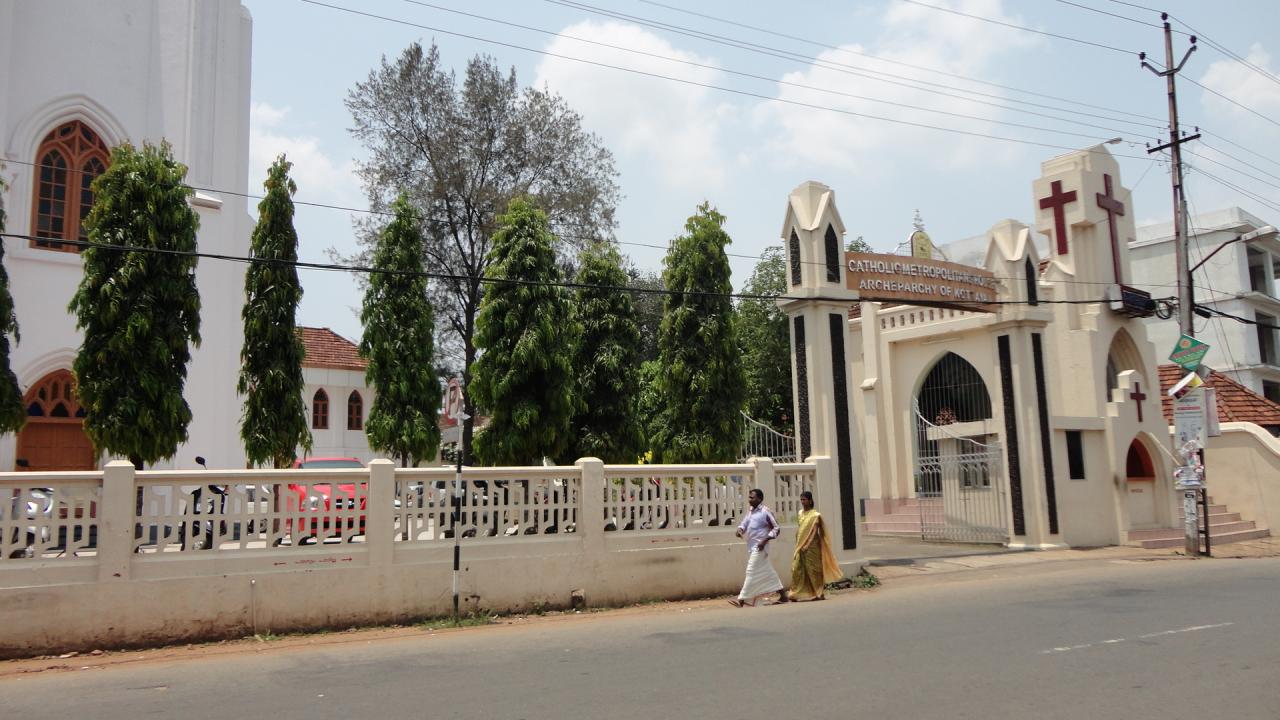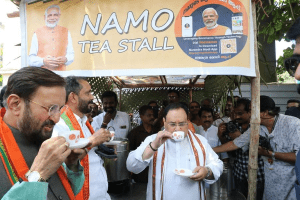The BJP has been long seeking to exploit Church concerns over issues such as 'Love Jihad', but will the laity fall in line?

The Arch-Eparchy of Knanaya Diocese in Kottayam. (Creative Commons)
A BJP-backed socio-political organisation comprising different Christian denominations of Kerala is the likely outcome of a closed-door meeting the party’s national president JP Nadda held with two archbishops in Kottayam on Tuesday, 27 September.
The BJP and the church leadership are tightlipped on their deliberations at the meeting, which was attended by Union Minister of State for External Affairs V Muraleedharan, BJP Kerala Prabhari Prakash Javadekar and state party chief K Surendran, and Knanaya Catholic Archbishop Mathew Moolakkatt and the Metropolitan Archbishop of Changanassery, Mar Joseph Perumthottam.
Highly placed Church sources, however, revealed that the meeting discussed, among other things, the need for a socio-political organisation that can bridge the gap between the church and the BJP.
The bishops responded positively to this suggestion by the BJP leadership, the sources told South First, as it could help the two sides “address common causes”.
For the BJP, its survival and growth in Kerala depends largely on wooing a sizeable share of the Christian vote bank, especially Catholics, in central Kerala.
Going by the 2011 census, Kerala’s Christians account for 18.38 percent of the population, while Muslims constitute 26.56 percent and Hindus comprise 54.73 percent.
Among the Christians, the Catholics form the single-largest entity.
As per the BJP’s plan, the proposed organisation would accommodate leaders and influencers not just from the Catholic community but also from other segments of Christianity in Kerala, mainly Orthodox Christians and Marthomites.
According to South First‘s sources, the bishops informed Nadda about a recent meeting of former legislative Assembly members, former ministers and other leaders from the Christian community in Kochi to form a collective called the Bharatiya Christian Sangamam (BCS) to advocate the cause of Christians in Kerala.
They told Nadda that the BCS had the potential to evolve as a broader and more robust platform for Christians who wish to have a harmonious relationship with the BJP.
Nadda was in Kottayam to inaugurate a newly-constructed office of the BJP, and he met the bishops on the premises of a church-run facility in the town. However, the hour-long meeting remained a secret from even district-level leaders of the BJP.
When contacted by South First, Knanaya diocese spokesman Dr George Karukaparambil claimed that the meeting involved nothing of political significance.
According to him, it was a courtesy visit as sought by the state leadership of the BJP. Meanwhile, district and state leaders of the BJP have preferred not to respond to questions about the meeting.
Senior priest Fr Paul Thelakkat, who is opposed to any alliance between the Sangh Parivar and the Catholic Church in the state, said it is doubtful whether the “opportunistic arrangement” proposed by the clergy would go down well with ordinary believers.

BJP national president JP Nadda sipping tea at a Namo stall in Kochi during his latest Kerala trip. (Supplied)
“The leadership may have its reasons to mend fences with the BJP and its government at the Centre. But ordinary believers might have a different viewpoint, and it would be challenging to create a vote bank favouring the Sangh Parivar within the community,” he told South First.
Nadda’s move comes at a time the state is feeling the tremors of the ban on the Islamic organisation Popular Front of India (PFI) and the Church sharing the BJP’s perception on sensitive issues such as “Love Jihad” and “Narcotic Jihad”.
A sizeable section of the clergy considers radical Islam a common enemy of Hindus and Christians. The Church leadership, in general, feels inching closer to BJP and its Union government will help it gain more benefits meant for minority welfare.
The Church has a long tradition of supporting the Congress in the state, but a section of its leaders now feel that the party is a spent force and the chances of its return to power are remote.
Ever since he became BJP president, Nadda has believed that the party must utilise the discomfort prevailing among Christians over the demographic changes in Kerala and issues like “Love Jihad”.
Though it tried its best, the BJP has failed so far to get a regional Christian political outfit into its fold. Now it’s hoping that the growing fear among Christians about Islamic fundamentalism in the state presents it an opportunity to to bring the community closer.
Even on Wednesday, 28 September, Muraleedharan accused the ruling CPI(M) and Opposition Congress in Kerala of patronising Islamic terrorism.
Demographic changes in Kerala are a concern Christian leaders have been raising for long, citing migration as well as decreasing birth rates among the faithful, and the increasing population of Muslims.

Jul 26, 2024

Jul 26, 2024

Jul 25, 2024

Jul 25, 2024

Jul 25, 2024

Jul 24, 2024